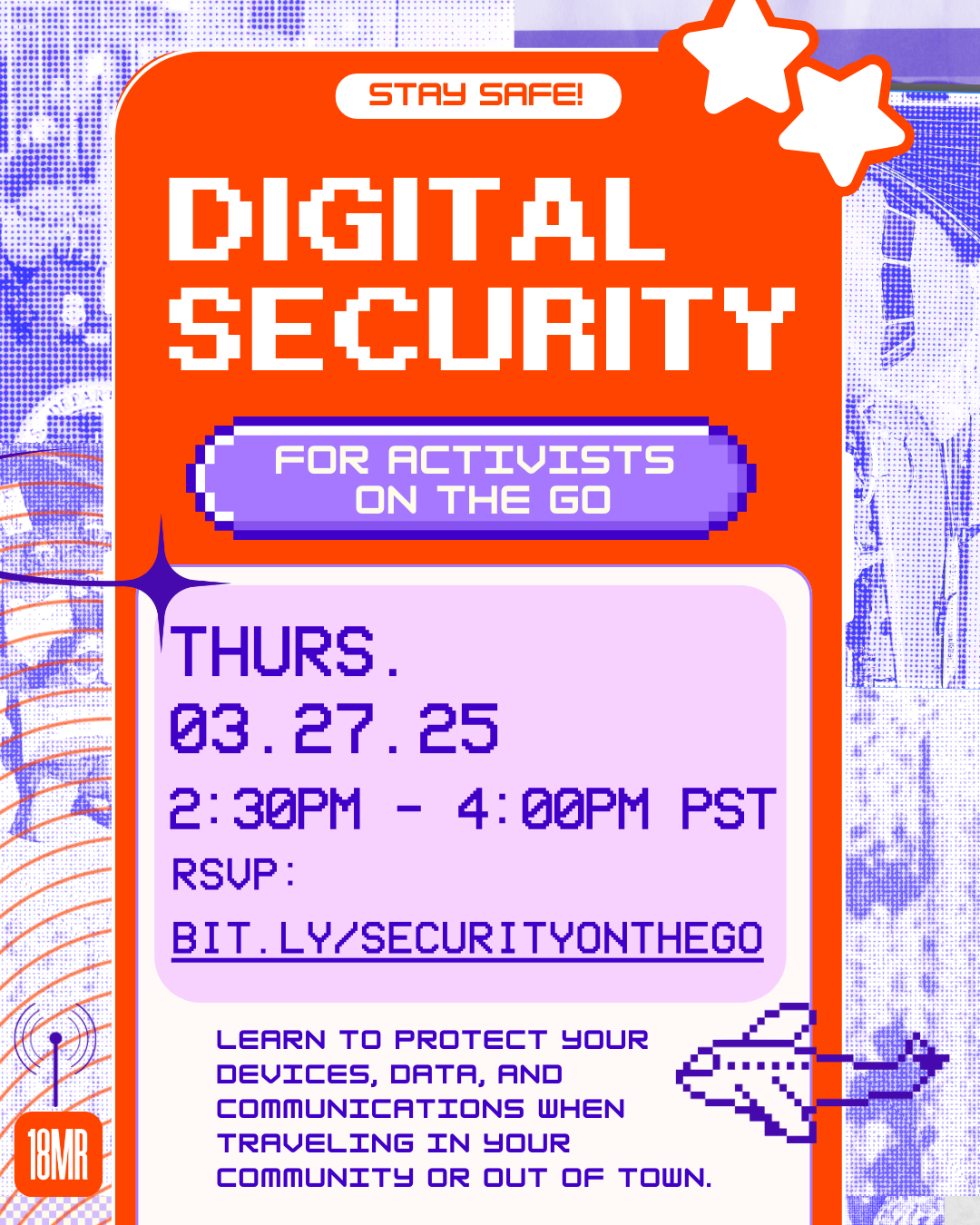
I just returned from a historic delegation of Palestinian, Indigenous, and Black leaders to convene with Irish freedom fighters and community organizers in the north of Ireland.
For those who are less familiar, Ireland was and continues to be a critical site of anti-imperialist struggle. The British occupied Ireland for over 800 years, forced the people to live in poverty, banned their indigenous language, controlled agriculture, the local economy, and deployed the police and military forces to control the local population. I learned quickly about the importance of language in Ireland – like how using the term ‘Britain’ instead of ‘United Kingdom’ is politically correct, because calling it the UK assumes that the territory is unified under British colonial power. This is especially true for the Irish, who are still fighting for reunification.
One of the deadliest days of their struggle was the 1972 Bloody Sunday Massacre, where British soldiers killed dozens of unarmed civilians in Derry. Our hosts for the week included the Doherty brothers, whose father was martyred during Bloody Sunday. They gave us a historical tour through the Bogside where the British army committed the worst mass shooting in the history of the north of Ireland. After his father’s murder, Tony Doherty went on to join the Irish Republican Army, later becoming a political prisoner and campaigning for justice for the families of the massacre. Doherty is currently the chairman of the Bloody Sunday Trust.
As Palestinians continue to be burned alive by Israeli bombs, with an onslaught of Israeli attacks on Yemen and Lebanon, we were able to place ourselves in a historic timeline of struggle with the camaraderie of the Irish – who are no strangers to occupation. Our delegates included leaders from the Adalah Justice Project, Arab Resource and Organizing Center, Hospitality for Humanity, Healthcare Workers for Gaza, Honor the Earth, Community Movement Builders, Palestinian Youth Movement – both Britain and U.S. leaders, Palestinian Feminist Collective, National Students for Justice in Palestine and me – from 18 Million Rising!
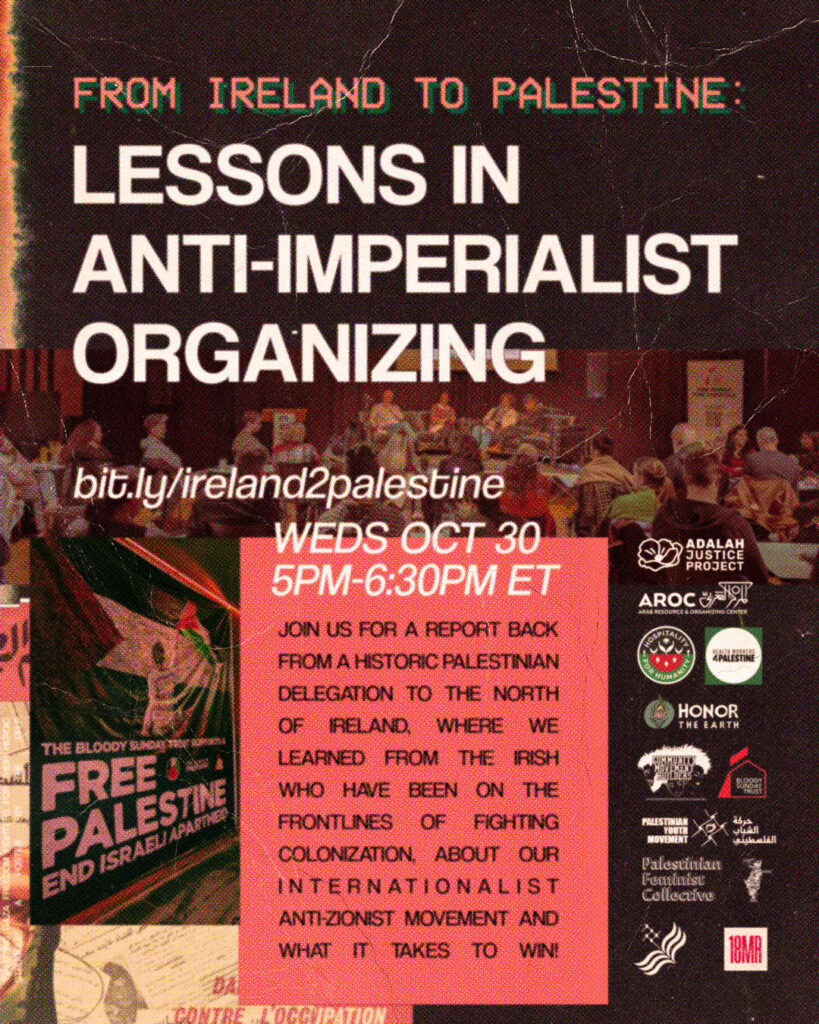

From the moment we landed in Derry, I was elated to see Palestinian flags on every corner of the city. The historic ‘You Are Now Entering Free Derry’ mural in the Bogside was covered in captivating art paying homage to the Palestinian people and national resistance, honoring journalist Moataz Aziza, who was in Ireland a few weeks prior. Derry has a fascinating history: in response to the Israeli massacre in Qana, Lebanon in 2006, organizers managed to pressure the city to kick weapons manufacturer Raytheon out.
Throughout the week, I learned about the state apparatus, limits of human rights and international law, and how far the colonial strategy of the British Empire reaches. The British invented modern torture and occupation; many of the techniques that have been used to brutalize the global South were experimented on the Irish, and later exported to its colonies. British colonial administrators moved from Ireland to my homeland of pre-partition India, deploying military tactics that repressed nationalist movements and violated human rights, stoking communalist tensions between political factions. More stark for me was the horrifying history of famine in both Ireland and Bengal. These famines in 1845 and 1943, respectively, were a result of policy failures by the British, where extractive agricultural practices contributed to the deaths of millions across South Asia and Ireland. I’m reminded that it was the British who were the key architects and negotiators of the original Zionist plan to colonize Palestine.
We had the unique opportunity to build with political prisoners and hunger strikers Martina Andersen and Laurence McKeown. They both spoke extensively about the role of mass incarceration, sexual violence and forced sterilization against movement leaders who were waging a national liberation struggle against an occupying force. Laurence taught poetry workshops, wrote curriculum, and used theater as a tool to build narrative and cultural power while unjustly incarcerated. He shared with us, “No revolutionary movement is complete without poetic expression.” Martina was released as part of the Good Friday agreement, and she went on to become a leader of Sinn Féin. She talked about the compromises and contradictions of governing power: the party’s controversial stance on abortion on one hand, and their growing diplomatic relationship to the imperialist United States on another.
The similarities between Irish and Palestinian liberation struggles were astonishing: Israeli forces are carpet bombing and mass arresting Palestinians across the occupied territories right now, and the U.S. has sent over $17B in military aid to this genocidal project since October 7. One of my most memorable moments of this exchange was when leaders of the Palestinian Youth Movement from the U.S. and Britain chapters gifted a copy of The Trinity of Fundamentals – a book that was smuggled out of Israeli prisons – to the former Irish political prisoners.
I was inspired by the possibilities of internationalist solidarity and how international boycotts can be a key site of agitation. We had a round table with organizers from the Ireland Palestine Solidarity Campaign and Sadaka, the Irish Palestinian Alliance, who are working to pass the Occupied Territories Bill, which effectively outlaws goods and sales from illegal Israeli settlements. This October, the Dublin City Council passed a motion to enact the bill, sending a loud and clear message that there will be consequences to a genocidal regime.
Right now, Irish peacekeeping forces in Lebanon are getting attacked by Israeli forces, and we are calling for an arms embargo from the ruling party. When reflecting on the delegation, my comrade Ora Wise wisely shared, “It is crucial for our movements to be self-reflective, engage in critical thinking, and be able to hold nuance and contradictions. We are not served well by self-righteousness or ideological purism.” This delegation served as a timely reminder of what lies ahead, and how we must face these contradictions head on.

- The Museum of Free Derry is a commemorative space to honor, mourn and struggle with the questions of Irish history. This film We Shall Overcome highlights the survivors and family members of the Bloody Sunday Massacre and their struggle for justice.
- Definitely watch Kneecap – this brilliant new film on Ireland’s first hip hop trio that was the first Irish language film at Sundance, brings action packed history to young people across the world. It’s hilarious!
- When preparing to meet political prisoners, I listened to this panel on the The Palestinian Prisoners Movement and the Struggle for Liberation from The People’s Conference for Palestine hosted by the Palestinian Youth Movement. It was unreal to hear from Sana Daqqa, the wife of Walid Daqqa, who smuggled her child out of an Israeli prison.
Everywhere we went in Ireland, we saw the words ‘Saoirse Don Palestine’ – which translates to ‘There is no freedom until Palestine is free!’
In solidarity,
– Sharmin, Irma, Turner, Kari, Leyen, Allison, Brenda, and Van – the 18MR Team
P.S. If you’ve enjoyed reading our monthly newsletter, would you chip in $5 so we can keep inviting rad guest editors?

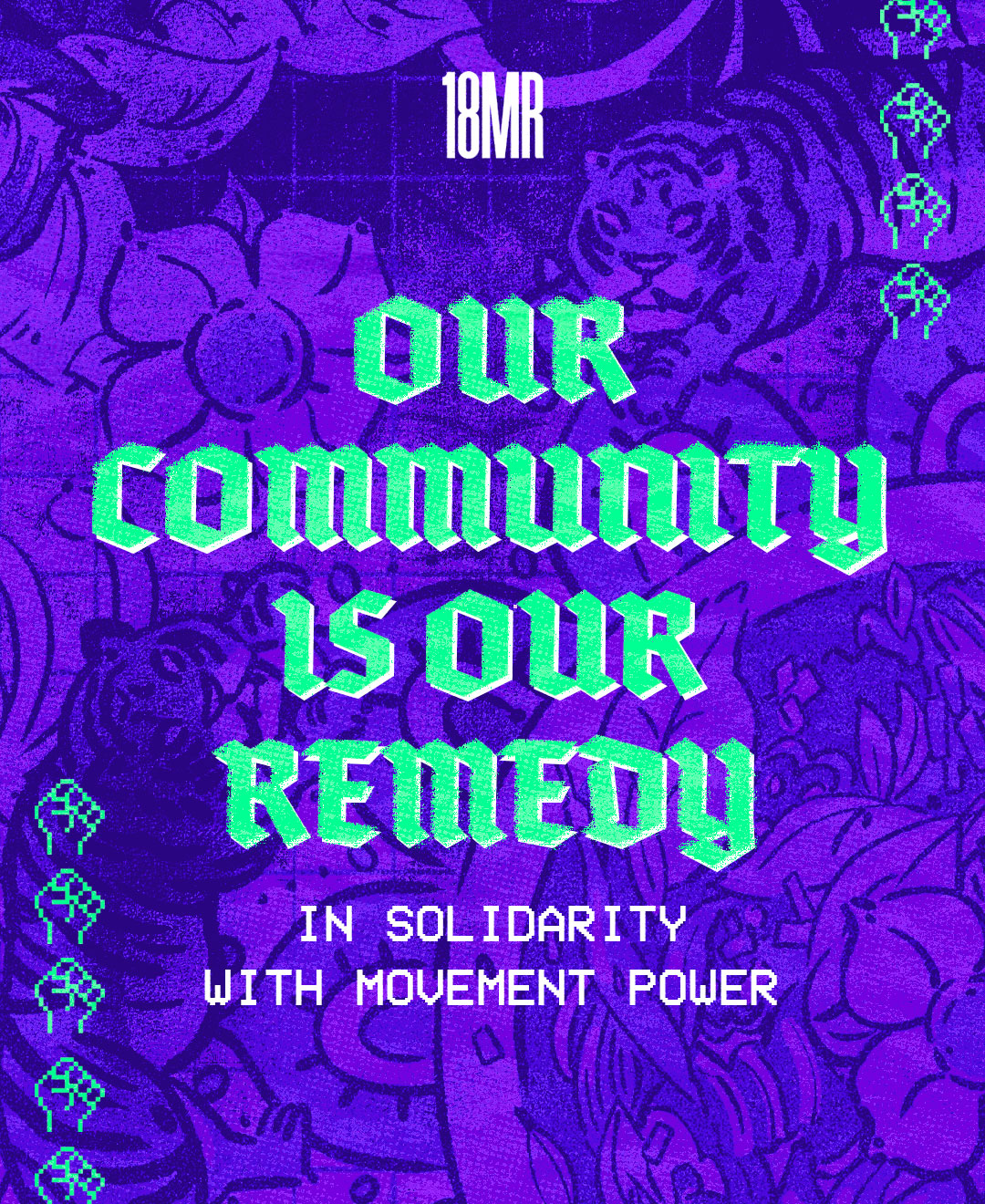
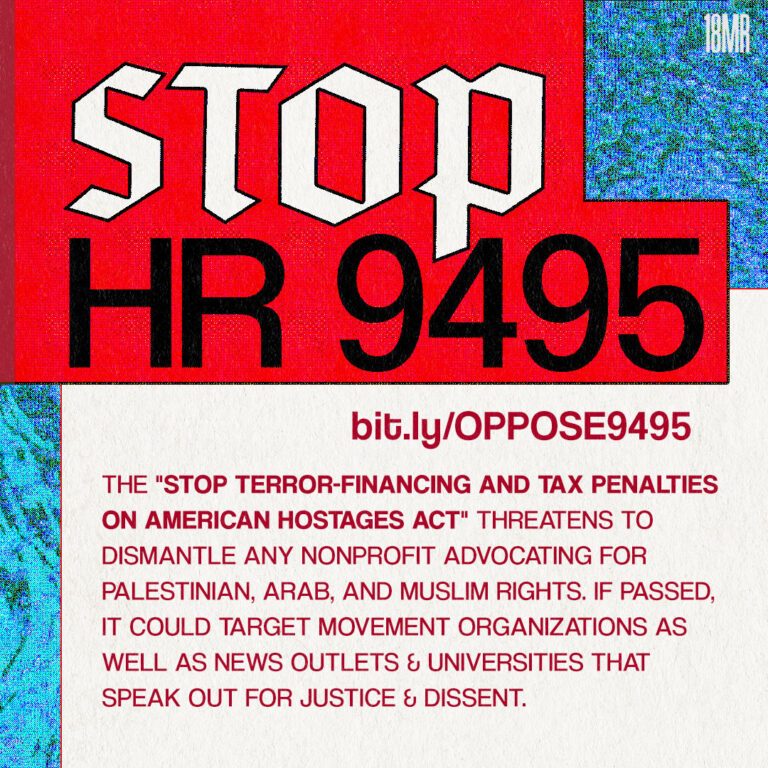
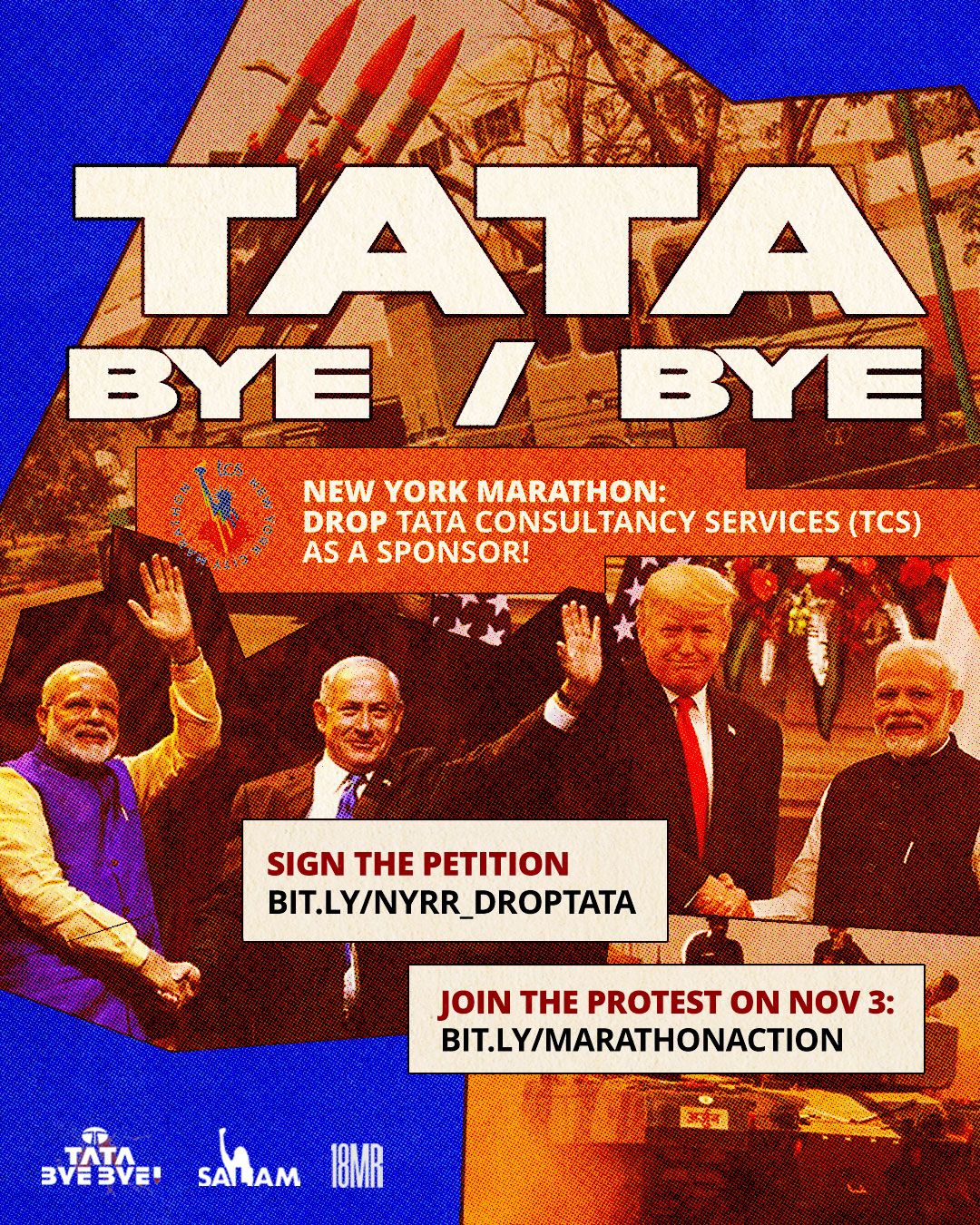

 UPDATE 11/4/24 Download our FREE ZINE for you to print out, fold and distribute to your community. Though the Marathon is over, we still must inform […]
UPDATE 11/4/24 Download our FREE ZINE for you to print out, fold and distribute to your community. Though the Marathon is over, we still must inform […]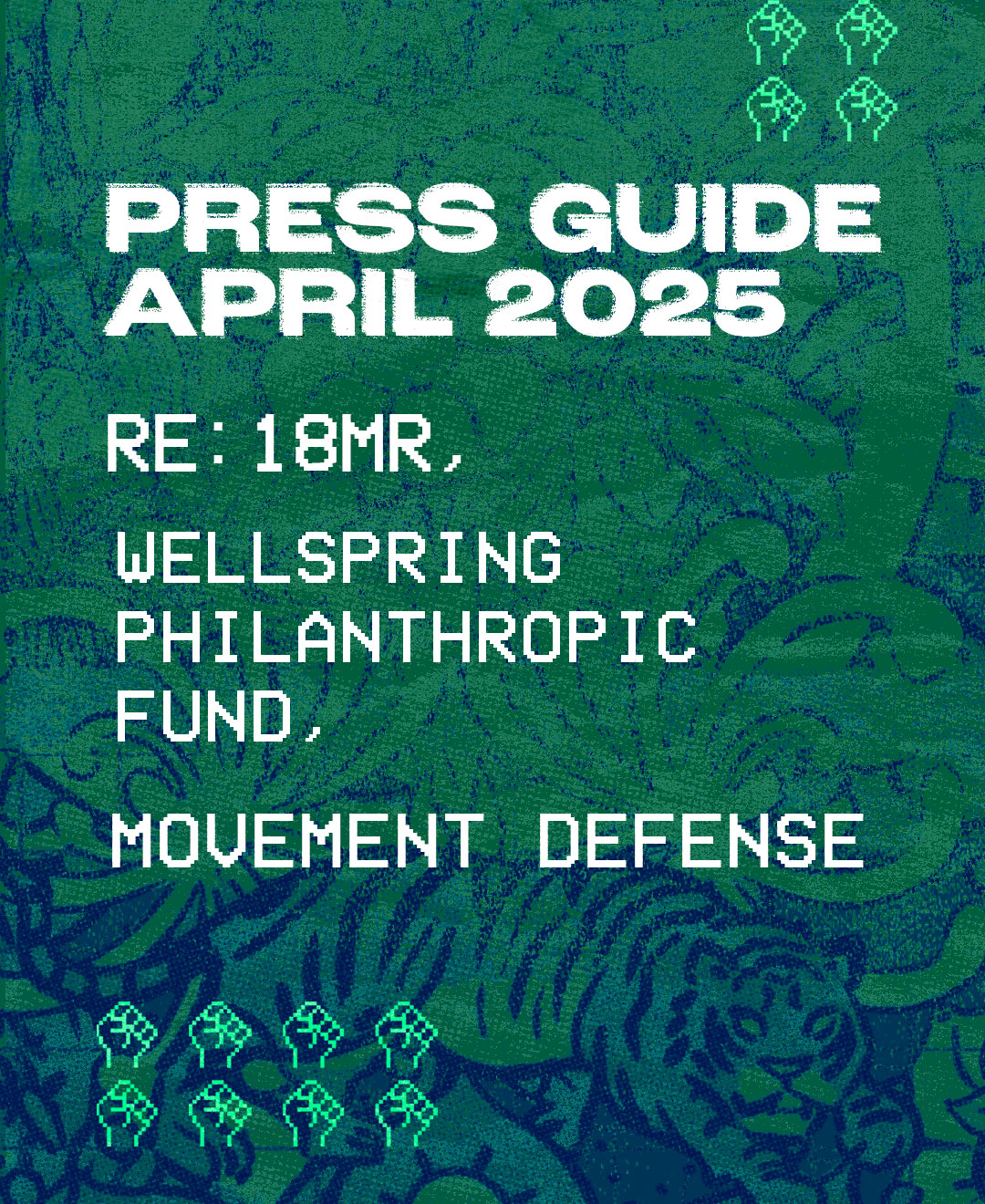

 “There are millions of Palestinian refugees all over – so when we think about our food sovereignty it’s about cultural preservation in the places that we’re in, and that’s inevitably interconnected with the other people […]
“There are millions of Palestinian refugees all over – so when we think about our food sovereignty it’s about cultural preservation in the places that we’re in, and that’s inevitably interconnected with the other people […]